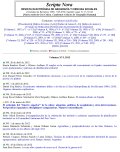Kanak and Ma’ohi adoption versus international adoption. Two attitudes within the globalization
Keywords:
Traditional/ International Adoption, Kanak, Ma’ohi, New Caledonia, French Polynesia, kinshipAbstract
Kanak and Ma’ohi people are used to practice Child Adoption in a traditional manners. Recently, with the rise of International Adoption and the lack of children in the Western Countries, childless parents are looking for a kid every where and sometimes in an unattractive way and I’ll discuss this point generally related to western welfare notion. So, many of French ones have begun to look for children in French Polynesian where they are used to give children within the fa’a’amu system. That means to maintain relations between the Polynesian family which give the baby and the French one which take him. Otherwise, Kanak people in New Caledonia don't give theirs children abroad. Why? So, a particular focus would be to understand why Kanak people don’t give child while French Polynesian Ma’ohi people allow inside the fa’a’amu child circulation some adoption abroad, essentially by childless French families. An other point on which I want to emphasize is how French administration in New Caledonia would like to control this traditional adoption, for the “welfare of the child”, and perhaps in the long term for putting some Kanak children in the international adoption circuit?Downloads
Published
2012-03-21
Issue
Section
Articles
License
Los autores que publican en esta revista están de acuerdo con los siguientes términos:
- Los autores conservan los derechos de autoría y otorgan a la revista el derecho de primera publicación, cin la obra disponible simultáneamente bajo una Licéncia de Atribución Compartir igual de Creative Commons que permite compartir la obra con terceros, siempre que estos reconozcan la autoría y la publicación inicial en esta revista.
- Los autores son libres de realizar acuerdos contractuales adicionales independientes para la distribución no exclusiva de la versió de la obra publicada en la revista (com por ejemplo la publicación en un repositorio institucional o en un libro), siempre que se reconozca la publicación inicial en esta revista.





